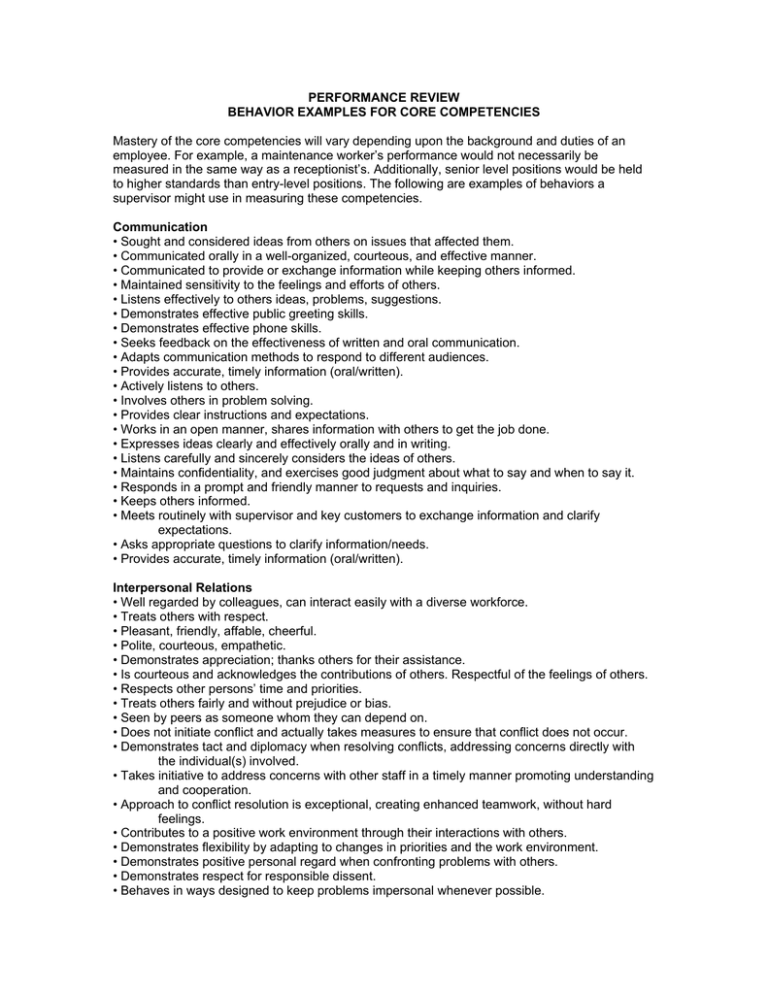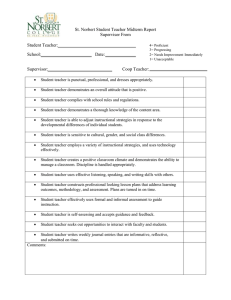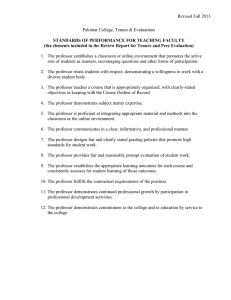Performance Review Behavior Examples For Core
advertisement

PERFORMANCE REVIEW BEHAVIOR EXAMPLES FOR CORE COMPETENCIES Mastery of the core competencies will vary depending upon the background and duties of an employee. For example, a maintenance worker’s performance would not necessarily be measured in the same way as a receptionist’s. Additionally, senior level positions would be held to higher standards than entry-level positions. The following are examples of behaviors a supervisor might use in measuring these competencies. Communication • Sought and considered ideas from others on issues that affected them. • Communicated orally in a well-organized, courteous, and effective manner. • Communicated to provide or exchange information while keeping others informed. • Maintained sensitivity to the feelings and efforts of others. • Listens effectively to others ideas, problems, suggestions. • Demonstrates effective public greeting skills. • Demonstrates effective phone skills. • Seeks feedback on the effectiveness of written and oral communication. • Adapts communication methods to respond to different audiences. • Provides accurate, timely information (oral/written). • Actively listens to others. • Involves others in problem solving. • Provides clear instructions and expectations. • Works in an open manner, shares information with others to get the job done. • Expresses ideas clearly and effectively orally and in writing. • Listens carefully and sincerely considers the ideas of others. • Maintains confidentiality, and exercises good judgment about what to say and when to say it. • Responds in a prompt and friendly manner to requests and inquiries. • Keeps others informed. • Meets routinely with supervisor and key customers to exchange information and clarify expectations. • Asks appropriate questions to clarify information/needs. • Provides accurate, timely information (oral/written). Interpersonal Relations • Well regarded by colleagues, can interact easily with a diverse workforce. • Treats others with respect. • Pleasant, friendly, affable, cheerful. • Polite, courteous, empathetic. • Demonstrates appreciation; thanks others for their assistance. • Is courteous and acknowledges the contributions of others. Respectful of the feelings of others. • Respects other persons’ time and priorities. • Treats others fairly and without prejudice or bias. • Seen by peers as someone whom they can depend on. • Does not initiate conflict and actually takes measures to ensure that conflict does not occur. • Demonstrates tact and diplomacy when resolving conflicts, addressing concerns directly with the individual(s) involved. • Takes initiative to address concerns with other staff in a timely manner promoting understanding and cooperation. • Approach to conflict resolution is exceptional, creating enhanced teamwork, without hard feelings. • Contributes to a positive work environment through their interactions with others. • Demonstrates flexibility by adapting to changes in priorities and the work environment. • Demonstrates positive personal regard when confronting problems with others. • Demonstrates respect for responsible dissent. • Behaves in ways designed to keep problems impersonal whenever possible. • Maintains positive work relationships. • Treats others with courtesy and respect. • Is cooperative and responsive. • Builds trust and works with integrity. • Treats others with respect, courtesy, tact, and friendliness and actively attempts to be helpful towards others. • Accepts criticism, is open to new ideas, and handles conflict constructively and diplomatically. • Consistently able to obtain the cooperation of others. • Works through conflict for positive solutions/results. • Promotes cooperation and teamwork. • Learns from conflict and makes appropriate changes. • Takes initiative to improve working relationships and foster feelings of mutual respect with coworkers and customers. • Makes a special effort to boost employee morale and create a positive work environment. Customer Service • Keeps appointments, call-return commitments, etc. • Is approachable and responsive to customers and others. • Shows appropriate patience with complaining customers and employees. • Treats the customer with respect and courtesy • Provides consistent, quality service to all customers. • Is available to the customer and provides accurate, consistent, and honest information. • Listens to the customer and provides feedback that will benefit the customer in the future. • Understands who the customer is. • Strives to satisfy customer needs. • Offers appropriate and innovative solutions to customer problems. • Demonstrates courtesy and a professional attitude in handling customer complaints. • Responds promptly to requests for information and/or assistance. • Meets customer expectations in a timely manner/Delivers what has been promised. • Follows up with customer in a timely manner. • Responds to telephone and e-mail messages within four hours. • Anticipates future needs/problems of customers and takes action to meet these needs or solve problems. • Makes an extra effort to keep customers accurately informed. • Understands the customer from their point of view. Has a thorough knowledge of the customer’s world and is able to anticipate customer’s requests. Accountability • Provides consistent, timely, high quality work. • Adheres to established work schedule. • Arrives at work and meetings on time. • Meets assigned deadlines without additional prompting by supervisor or others. • Follows established call-in procedures for their department and submits leave request form within four hours of returning to the work place. • Submits time sheets on time and correctly completed. • Actions and speech reflect a commitment to the agency. • Always finishes assignments on time, meets deadlines. • Administrative paperwork is accurate and submitted on time. • When on leave, arrangements are made for “current” work/responsibility to continue. • Responds to change with a genuine desire to do what it takes to get the job done, regardless of the need to make adjustments. Employee accepts the change and is instrumental in seeing that the change is perceived positively by others and is carried out in a way that improves the overall operation of the department. • Knows how to keep confidential information confidential. • Never disparages the agency or its employees in public. • Completes projects ahead of time without compromising the quality of work. • Conveys a positive and professional image of the agency to others. • Adapts well to new situations, unusual demands, emergencies, or critical incidents. • Behaves in a businesslike manner. • Avoids gossip and negative rumors. • Seeks new and/or additional on-the-job training opportunities to obtain mastery over tasks, expand personal knowledge and add value to the work group. • Demonstrates initiative consistent with job expectations to improve performance. • Employee performs their standard duties throughout the year and in addition takes on several large projects and some smaller ones that have a significant impact on the department. • Completes work by established time lines and routinely uses time efficiently. • Employee completes work well in advance of deadlines so that the supervisor has plenty of time to review documents and make revisions, rather than receiving documents just before the deadline with little time for adequate proof reading and revisions. • Demonstrates professional job-specific skills necessary to provide the appropriate quality of work. • Not only demonstrates specific job skills, but also takes the initiative to learn higher level skills that enhance ability to contribute to the organization. • Creates a positive work environment and influences the behavior of other employees by their supportive and optimistic approach to daily activities within the work environment. • Assists coworkers in response to fluctuations in workloads. • Does not need to be asked to assist others in times of need. Employee jumps in and volunteers to assist others, even in areas where one may not expect them to routinely volunteer. Besides volunteering for the obvious needs, the employee senses other less obvious needs within the organization and provides additional assistance creating improved morale and work production. • Serves citizens of the state • Demonstrates concern for the larger community served by the organization. Job Knowledge • Possesses appropriate expertise to perform job at a professional level. • Takes opportunities to increase knowledge of relevant job skills. • Complete assignments accurately and in a timely and efficient manner. • Shares knowledge with co-workers • Maintains currency on level of professional/Technical knowledge

